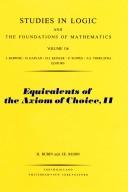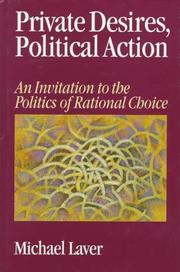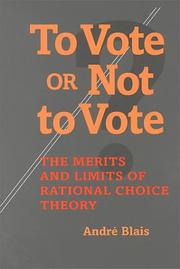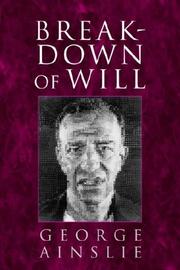| Listing 1 - 10 of 61 | << page >> |
Sort by
|
Periodical
Abstract | Keywords | Export | Availability | Bookmark
 Loading...
Loading...Choose an application
- Reference Manager
- EndNote
- RefWorks (Direct export to RefWorks)
Universities and colleges --- College choice --- Universités --- Choix --- United States.
Book
ISBN: 2763739644 9782763739649 Year: 2018 Publisher: Quebec : Presses de l'Universite Laval,
Abstract | Keywords | Export | Availability | Bookmark
 Loading...
Loading...Choose an application
- Reference Manager
- EndNote
- RefWorks (Direct export to RefWorks)
L'economiste se presente comme un être avec deux discours fort differents. Le premier se veut scientifique : il vise à expliquer les phenomenes sociaux en recourant generalement à un mode d'approche, l'individualisme methodologique, selon lequel les phenomenes peuvent être expliques à partir des actions des individus et de leurs interactions. Ce discours represente l'economie positive. Le deuxieme type de discours veut juger au lieu de se contenter d'expliquer. C'est l'economie normative. Cette branche devrait plutôt s'appeler "morale economique". Lorsqu'un economiste se prononce s'il faut realiser un projet ou adopter une politique quelconque, il ne fait pas de la science. Le mot "faut" montre bien que la question se situe dans le domaine des prescriptions basees sur des normes. Face au monde reel, il y a deux voies : le comprendre ou vouloir le reformer. La premiere m'apparaît la tâche fondamentale de l'economiste.
Periodical
Year: 2003 Publisher: Tustin, CA : Timonium, MD : Litigation One Publishing, American Society of Trial Consultants
Abstract | Keywords | Export | Availability | Bookmark
 Loading...
Loading...Choose an application
- Reference Manager
- EndNote
- RefWorks (Direct export to RefWorks)
Trial practice --- Jury selection --- Psychological aspects --- United States. --- Choix du jury --- Aspect psychologique
Periodical
Abstract | Keywords | Export | Availability | Bookmark
 Loading...
Loading...Choose an application
- Reference Manager
- EndNote
- RefWorks (Direct export to RefWorks)
Decision making --- Social choice --- Management Theory --- Prise de décision --- Choix collectif

ISBN: 1281788309 9786611788308 0080887651 0444877088 Year: 1985 Volume: 116 Publisher: Amsterdam : North-Holland,
Abstract | Keywords | Export | Availability | Bookmark
 Loading...
Loading...Choose an application
- Reference Manager
- EndNote
- RefWorks (Direct export to RefWorks)
This monograph contains a selection of over 250 propositions which are equivalent to AC. The first part on set forms has sections on the well-ordering theorem, variants of AC, the law of the trichotomy, maximal principles, statements related to the axiom of foundation, forms from algebra, cardinal number theory, and a final section of forms from topology, analysis and logic. The second part deals with the axiom of choice for classes - well-ordering theorem, choice and maximal principles.
Axiom of choice. --- Axiomatic set theory. --- Axioms --- Logic, Symbolic and mathematical --- Set theory --- Choice, Axiom of --- Axiomatic set theory --- Axiom of choice --- Axiome du choix --- ELSEVIER-B EPUB-LIV-FT --- Choix (Axiome du). --- Keuzeaxioma.
Book
ISBN: 2111398705 Year: 2014 Publisher: Paris : Département des études, de la prospective et des statistiques,
Abstract | Keywords | Export | Availability | Bookmark
 Loading...
Loading...Choose an application
- Reference Manager
- EndNote
- RefWorks (Direct export to RefWorks)
Principalement fondées sur des enquêtes de terrain, ces études examinent la situation actuelle des petits éditeurs et établissent un bilan démographique des mouvements de création et de disparition de maisons d’édition entre 1988 et 2005. Elles décrivent notamment les conditions de fonctionnement de ces maisons, la spécificité de leurs choix éditoriaux et leurs difficultés d’accès au marché, tout en replaçant dans le contexte général de la profession les perspectives et les attentes de ces petites structures éditoriales. These studies, which are based mainly on on-the-spot surveys, examine the present situation of small publishers and provide a “demographic” record of the birth and demise of publishing houses from 1988 to 2005. The studies describe the conditions under which these publishers operate, their individual editorial policies, their difficulties in penetrating the market, and set the prospects and hopes of these small publishing concerns within the general context of the trade.
Business --- Cultural studies --- economics of culture and Communication --- cultural businesses --- publishing --- économie de la culture et de la communication --- édition --- entreprises culturelles --- maison d'édition --- marché --- choix éditoriaux

ISBN: 0761951148 0761951156 1446217043 1857021894 1282559834 9786612559839 0857021893 9780857021892 9780761951148 9780761951155 9781282559837 0587021893 9780587021892 Year: 1997 Publisher: London: Sage,
Abstract | Keywords | Export | Availability | Bookmark
 Loading...
Loading...Choose an application
- Reference Manager
- EndNote
- RefWorks (Direct export to RefWorks)
'Private Desires, Political Action' is a masterly & exceptionally clear survey of the fast expanding and notoriously difficult field of rational choice theory.
Political science --- Rational choice theory --- Science politique --- Choix rationnels, Théorie des --- Methodology --- Méthodologie --- Political science. --- Political science -- Methodology. --- Politics and government. --- Rational choice theory. --- Methodology. --- Choix rationnels, Théorie des --- Méthodologie --- Social choice --- Politics --- #SBIB:324H20 --- #SBIB:35H006 --- #SBIB:IO --- Politologie: theorieën (democratie, comparatieve studieën….) --- Bestuurswetenschappen: theorieën --- Hanson, James,

ISBN: 0822957345 0822941295 9780822941293 9780822957348 9780822990550 0822990555 1306553792 9781306553797 Year: 2000 Publisher: Pittsburgh, Pa. University of Pittsburgh Press
Abstract | Keywords | Export | Availability | Bookmark
 Loading...
Loading...Choose an application
- Reference Manager
- EndNote
- RefWorks (Direct export to RefWorks)
What makes people decide to vote? In addressing this simple question, André Blais examines the factors that increase or decrease turnout at the aggregate, cross-national level and considers what affects people's decision to vote or to abstain. In doing so, Blais assesses the merits and limitations of the rational choice model in explaining voter behavior. The past few decades have witnessed a rise in the popularity of the rational choice model in accounting for voter turnout, and more recently a groundswell of outspoken opposition to rational choice theory. Blais tackles this controversial s
Rational choice theory --- Voting --- #SBIB:011.AANKOOP --- #SBIB:324H42 --- #SBIB:32H3 --- Balloting --- Polls --- Elections --- Politics, Practical --- Social choice --- Suffrage --- Politieke structuren: verkiezingen --- Politieke wetenschappen: inleidende werken, handboeken, methoden --- Rational choice theory. --- Voting. --- Vote --- Choix rationnels, Théorie des --- Government - General --- Law, Politics & Government --- Political Institutions & Public Administration - General --- Théorie du choix rationnel --- Sciences politiques --- Elections et referendum

ISBN: 0521596947 052159300X 1107114403 0511173792 0511017669 0511153031 0511302193 1139164198 1280429275 051105436X 0511039123 9780511039126 9780521593007 9780521596947 9780511017667 9781139164191 Year: 2001 Publisher: Cambridge Cambridge University Press
Abstract | Keywords | Export | Availability | Bookmark
 Loading...
Loading...Choose an application
- Reference Manager
- EndNote
- RefWorks (Direct export to RefWorks)
Ainslie argues that our responses to the threat of our own inconsistency determine the basic fabric of human culture. He suggests that individuals are more like populations of bargaining agents than like the hierarchical command structures envisaged by cognitive psychologists. The forces that create and constrain these populations help us understand so much that is puzzling in human action and interaction: from addictions and other self-defeating behaviors to the experience of willfulness, from pathological over-control and self-deception to subtler forms of behavior such as altruism, sadism, gambling, and the 'social construction' of belief. This book integrates approaches from experimental psychology, philosophy of mind, microeconomics, and decision science to present one of the most profound and expert accounts of human irrationality available. It will be of great interest to philosophers and an important resource for professionals and students in psychology, economics and political science.
Choice (Psychology). --- Self-defeating behavior. --- Will. --- Volonté --- Choix (psychologie) --- Choice (Psychology) --- Self-defeating behavior --- Self-Injurious Behavior --- Volition --- psychology --- Philosophical anthropology --- Affective and dynamic functions --- Volition. --- psychology. --- Volonté. --- Arts and Humanities --- Philosophy
Book
ISBN: 1589017919 9781589017917 1589017773 9781589017771 9781589017771 Year: 2011 Publisher: Washington Georgetown university press
Abstract | Keywords | Export | Availability | Bookmark
 Loading...
Loading...Choose an application
- Reference Manager
- EndNote
- RefWorks (Direct export to RefWorks)
William F. West examines the checkered history of program budgeting (PPB) as a means of rationalizing the allocation of resources within and across government agencies. The book includes an in-depth study of the adoption and effects of PPB at the National Oceanic and Atmospheric Administration. West also discusses how the disappointing results of PPB speak more broadly to the goals and assumptions of formal requirements for planning and performance assessment.
Managerial accounting --- Program budgeting --- Total quality management in government --- Management accounting --- Accounting --- #SBIB:35H410 --- Beleidscyclus: algemene werken --- Qualité totale dans l'administration publique --- Rationalisation des choix budgétaires --- Comptabilité de gestion
| Listing 1 - 10 of 61 | << page >> |
Sort by
|

 Search
Search Feedback
Feedback About UniCat
About UniCat  Help
Help News
News